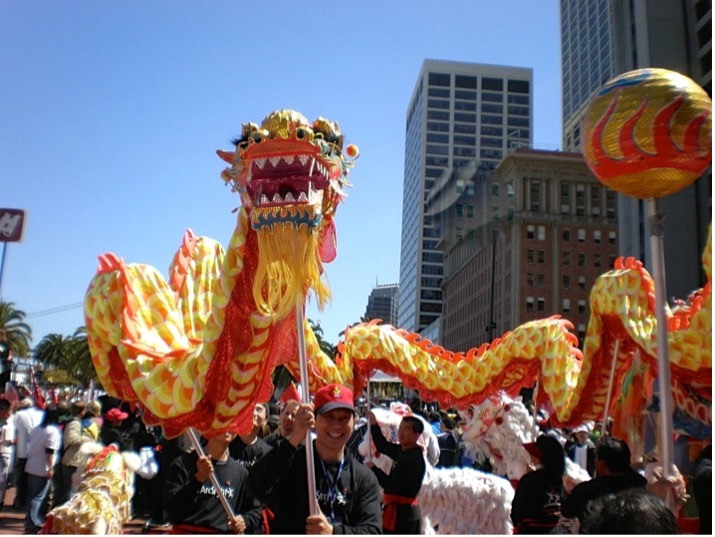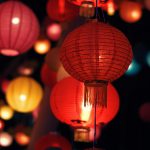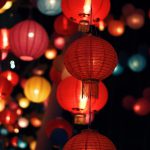Chinese New Year (aka Spring Festival) is one of the most important celebrations in China and it represents the arrival of Spring. The festival is oriented around the removing bad and old and welcoming the new and good as well a time to honour and worship ancestor.
Chinese New Year takes place on the second new moon after the winter solstice (December 21st). China follows the Lunar Calendar meaning the New Year’s will fall on a different date each year (between the dates of 21st January and 20th February). The year of the Tiger will start on 1st February 2022 and last until 22nd January 2023.
Lunar New Year
According to the Lunar calendar, the year will be 4720 which will mark the Year of the Tiger. The Lunar Calendar follows synodic months (complete cycle of phases of the moon) with 29.53 days in a month which adds up to 354 days in a year (11 less than in the Gregorian calendar). As there are 11 less days in the Lunar Calendar, every 2nd or 3rd year, the Lunar Calendar has a leap month to prevent the two calendars becoming more than half a month out of sync, there is a 13th leap month (which also represents the number of times the moon orbits the sun in a year) which means in a leap year there are there are 383-385 days. The lunar calendar is mainly used in Asian countries with countries such as China, Japan, Korea and Vietnam.
Sheng Xiao

Sheng Xiao is the Chinese Zodiac and it derives from Chinese legend with deity Emperor Huangdi (The Yellow Emperor) who was said to invent the Lunar Calendar. Sheng Xiao dates back to Zhan Guo (Warring States) Period which lasted between the years of 476 – 221 BC. Traditional Chinese Religion states that the Jade Emperor invited all the animals in the world for a race (which included crossing a huge river) and the order of the Zodiac animals is the order of the race.
Rat – shǔ
Ox – niú
Tiger – hǔ
Rabbit – tù
Dragon – lóng
Snake – shé
Horse – mǎ
Sheep – yáng
Monkey – hóu
Rooster – jī
Dog – gǒu
Pig – zhū
The cunning rat could not finish by itself so because it was too exhausted. Instead, the rat won the race by using its smarts, as the rat persuaded the ox to let it ride on its head to help him cross the river but before the end of the race, he dashed for the finish and won cementing the rat as the winner of the race.
After the ox was the tiger in a close third place but the tiger fell short of the ox as he was sent off-course because of the current in the river. In fourth was the rabbit – who like the rat – was too exhausted but it managed to hang onto a log that was floating across.
In fifth is a mythical creature – the dragon. Today, the dragon is misunderstood as in the West, dragons are viewed as evil and dangerous whilst in China, dragons are believed to be a symbol of wealth, wisdom, power, authority, luck, strength and nobility. In Chinese mythology, they are depicted as being welcoming and a sign that good things are about to happen. The dragon only finished in fifth because it was said to have gone to save a nearby village which was on fire and when it returned, the dragon helped the rabbit across the finish and into safety. Fun fact about the dragon, it is the most common year people are born in.
Similarly, to the rat and the ox, the snake hitched a ride on the horse. The snake wrapped itself around one of the horse’s legs without it knowing in order to save energy and when they approached the finish, the snake popped out frightening the horse as it slithered its way into sixth.
Places eight to ten were occupied by the sheep (in some cultures a goat), the monkey and the rooster respectively who worked as a team to create a raft to help them cross the river. The penultimate animal in the race was the dog who was more interested in playing in the river than crossing it. Finally, there was the pig in twelfth place who got peckish and was distracted so it went off to find food and ended up dozing off before eventually crossing the line in last place; the Jade Emperor was close to giving up on the pig and didn’t think it would be able to finish but the pig prevailed none the less.
One animal that is important in Chinese culture but didn’t appear in the race was the cat who had tendencies to lie in so it asked the rat to wake it up before the race which the rat forgot to so and the cat ended up missing the race which is said to be the reason why cats and rats are now mortal enemies – no wonder why Tom dislikes Jerry so much.
Each animal having a place (whether it’s 1 or 12) is said to be a huge honour for the animal.
If you were born in the Year of the Rat 鼠, you are said to be smart and wealthy.
If you were born in the Year of the Ox 牛, you are said to be kind and honest.
If you were born in the Year of the Tiger 虎, you are said to be brave and competitive.
If you were born in the Year of the Rabbit 兔, you are said to be compassionate and loving.
If you were born in the Year of the Dragon 龍, you are said to be a leader and honest.
If you were born in the Year of the Snake 蛇, you are said to be mysterious and passionate.
If you were born in the Year of the Horse 马, you are said to be generous and independent.
If you were born in the Year of the Sheep 羊, you are said to be clever and reliable.
If you were born in the Year of the Monkey 猴, you are said to be sociable and lively.
If you were born in the Year of the Rooster 鸡, you are said to be faithful and a thinker.
If you were born in the Year of the Dog 狗, you are said to be obedient and courageous.
If you were born in the Year of the Pig 猪, you are said to be chivalrous and gallant.
Your Ben Ming Nian (Zodiac birth year) is considered by many to unlucky rather than fortunate. To protect yourself from evil spirits, you are said to have to wear red underwear for every day that year or be accompanied by your spouse at all times.

Wuxing
In Chinese religion, there are 5 elements of Philosophy and Culture: wood, fire, earth, metal and water. The elements are believed to be the fundamental resources of everything in the universe and heaven and they are said to explain the interactions between things. The five elements come in a particular order and create a circular system.
Wood makes fire.
Fire makes earth.
Earth makes metal.
Metal makes water.
Water makes wood.

Along with Sheng Xiao, Wuxing helps to create the Sexagenary cycle (also known as the Stems-and-Branches or ganzhi) which equates to 60 years. The stems and branches idea come from heavenly stems and earthly branches. For the first 12 years, each zodiac animal is wood. For the next 12 years, each zodiac animal is fire and so on. Sexagenary cycles were once used as a way of recording time in Eastern Asia.
Rin Yin
1st February marks the beginning of Rin Yin – the year of the Water Tiger. This will also mark the 39th year of the Sexagenary cycle. Anyone born in the water cycle of the Sexagenary cycle (2022-2031) is said to be articulate and clever.
Anyone born in the year of 2022 is predicted to be competitive and brave but unpredictable.
The tiger is also an image of fortune and many Chinese children wear hats or shoes that depict a tiger for good luck.
Traditions

Chinese New Year tends to last 2 weeks from Chinese New Year’s Eve (31st February 2022 – 15th February 2022)
The colour red in China is considered to be lucky and used to use evil spirits at bay and people set up many red decorations such as red lunar lamps and banners. Chinese people also tend to clean their houses before the Spring Festival which symbolises sweeping away bad luck which reflects the idea of Feng Shui (or Chinese geomancy) which is the idea of using energy forces to harmonise the environment.
The aforementioned idea of worshiping ancestors is reflected by the tradition of offering sacrifices before a reunion dinner. On Chinese New Year’s Eve, whole families get together for a ‘reunion dinner’ and enjoy a big feast together.
A common gift to children, unmarried men or retired adults is an envelope full of money called Hong Bao or Ya Sui Qian which refers to the supressing of Sui who is a demon in Chinese mythology. The amount of money normally features the numbers 8 or 6 (and never 4) as they are homophonic of the ideas of wealth and smooth/good fortune respectively.
Chinese New Year also tends to bring out extensive celebrations such as setting off of fireworks and watching dragon and lion dances which are said to bring prosperity and good luck.
Custom foods include fish as it sounds like ‘surplus’ and represents the idea of abundance; dumplings which represent prosperity and glutinous rice cake,
There are also a few things you shouldn’t do on Chinese New Year such as sweep up or wash clothes as it represents sweeping/washing away your luck.
Chinese New Year ends with the Lantern Festival where lanterns are lit and left to float.

Xin nian kuai le Gong Xi Fa Cai



